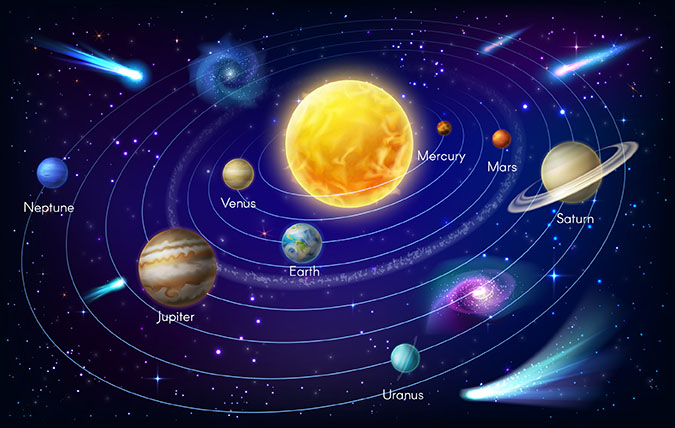
Venus
Definition
Venus is the second planet from the Sun and the hottest planet in our solar system. It is a terrestrial planet, meaning that it is made of rock and metal.
Venus is similar in size and composition to Earth, but it has a very different atmosphere. The atmosphere of Venus is made up of mostly carbon dioxide, with small amounts of nitrogen, oxygen, and sulfuric acid.
The atmosphere of Venus is so thick that it traps heat, making Venus very hot. The surface temperature of Venus is about 864°F (462°C), which is hotter than the melting point of lead.
Venus does not have any moons. It has a very slow rotation, taking 243 Earth days to rotate on its axis.
Venus is a very interesting planet, and scientists are still learning about it. There are many unanswered questions about Venus, such as why it is so hot and why it does not have any moons.
How can the word be used?
The planet Venus is named after the Roman goddess of love and beauty.

Different forms of the word
Noun:
- the second planet from the sun, the brightest object in the sky after the moon.
- the Roman goddess of love and beauty.
Adjective: of or relating to Venus.
Etymology
The word "Venus" comes from the Latin word "Venus", which is the name of the Roman goddess of love and beauty.
The first recorded use of the word "Venus" in English was in the 13th century.
Question
What might it be like to live on Venus?
AQA Science Exam Question and Answer
Question:
Explain the greenhouse effect on Venus and its implications for the planet's extreme surface temperature. How does Venus's atmosphere contribute to this phenomenon?
Answer:
The greenhouse effect on Venus is a phenomenon where certain gases in the planet's atmosphere trap heat from the Sun, leading to extremely high surface temperatures. Venus has a thick atmosphere primarily composed of carbon dioxide, which acts as a potent greenhouse gas. Sunlight passes through this atmosphere and reaches the surface, where it is absorbed and re-radiated as heat. However, the thick layer of carbon dioxide prevents much of this heat from escaping back into space, causing the planet to heat up.
In a process analogous to a greenhouse, where glass traps heat, Venus's atmosphere traps heat from escaping, causing a runaway greenhouse effect. As a result, temperatures on Venus can soar to scorching levels of around 900 degrees Fahrenheit (475 degrees Celsius), hotter than the surface of Mercury despite being farther from the Sun.
The abundance of carbon dioxide in Venus's atmosphere intensifies this greenhouse effect, contributing to its inhospitable conditions. The extreme temperatures and harsh environment make Venus a fascinating case study for understanding the impacts of greenhouse gases and their role in shaping planetary climates. Studying the greenhouse effect on Venus helps scientists better comprehend Earth's own climate system and the potential consequences of human-induced changes to greenhouse gas concentrations.